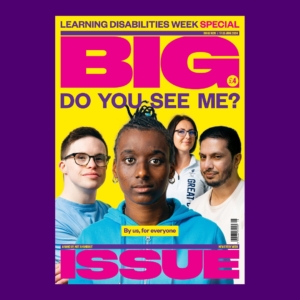Paralympian Jessica-Jane Applegate on winning gold and being told she doesn’t look disabled enough
Virtus Ambassador Jessica-Jane Applegate was recently spotted on the cover page of the UK’s ‘Big Issue Learning Disability Week edition, “Do You See Me?” The magazine was created in association with @mencap, by people with an intellectual impairment to help illustrate what they go through, celebrate their vital place in society, and present an edition from their perspective as they wanted it built.

Do you see me? cover page by ‘The Big Issue’
Jessica-Jane Applegate is a swimming sensation who has captivated audiences with her remarkable achievements. At just 16, she won a gold medal for the UK, setting a Paralympic record in the 200m freestyle at the London 2012 Games. Four years later, she competed in the Rio Paralympics, earning silver and bronze medals, and in Tokyo 2021, she won gold in the relay and two bronze medals for freestyle and backstroke. Now aged 27, Jessica-Jane, who started swimming at a young age following her autism diagnosis, aims to inspire others to pursue their dreams.
Speaking in the article, Jessica-Jane said “I love winning medals because it makes me feel like all the hard training and work that I’ve put in has paid off. My favourite is gold. I love coming first,” she says, reflecting on her journey.
Jessica-Jane’s dedication to her sport is evident in her rigorous training schedule. “My training regime is really busy. I train every day except Sunday. I am in the pool once a day, sometimes twice, and I go to the gym. But I love the routine and I have been doing it for 12 years now,” she explains.
Growing up, Jessica-Jane struggled with excess energy and a lack of concentration.
“I’d tried different things, but they were more group activities and I didn’t communicate well. My mum took me to the special needs swim school, where my teachers were really understanding and I didn’t need to interact with anyone else, just swim,” she recalls.
The water has always been a place of solace for her. “I love being somewhere I can be me. It is somewhere I fit in, and I love the sound of water. It’s peaceful underwater and I feel safe away from the rest of the world,” she says.
Despite her impressive accomplishments, Jessica-Jane faces challenges due to her hidden disabilities.
“I have a learning disability with multiple health conditions, but you can’t see them. I wish the world was more inclusive for people with unseen disabilities,” she shares.
She recounts a viral TikTok video of her swimming during lockdown, where people commented, “What’s wrong with you? Broken an eyelash?” highlighting the ignorance she often encounters.
“Sponsorship is so much harder when you have a hidden disability. I’ve literally been told by brands that having a learning disability doesn’t fit their criteria at the time of the Paralympics. They want someone who looks obviously disabled so that people don’t question them or say, ‘there’s nothing ‘wrong’ with them,” she reveals. She even had a brand ask her, “Do you know anyone who looks more disabled than you who we could use for a TV advert?”
To others with learning disabilities, Jessica-Jane offers this advice: “You should not let anyone tell you that you can’t go for your dreams. They are your dreams and, as long as you enjoy it, then you should go for it.”
Many athletes with intellectual impairment go through similar issues like Jessica-Jane and Virtus Sport is on a mission to raise more awareness of intellectual impairment and elite sporting opportunities for the same group.
We want to congratulate Big Issue magazine for focussing on this important issue.
As the Paris 2024 Summer Paralympics approach, taking place from August 28 to September 8, Virtus Sport has launched #MakingInvisibleVISIBLE to celebrate athletes with intellectual impairments and autism who will be competing at the upcoming Paralympic Games- Paris 2024 across three sports Athletics, Swimming and Table Tennis. #
#MakingInvisibleVISIBLE’ will:
- Leverage the platform of the Paris 2024 Summer Paralympic Games to raise awareness about intellectual impairments and make the invisible impairment ‘VISIBLE’.
- Challenge societal stereotypes surrounding individuals/athletes with intellectual impairments and/or autism.
- Encourage people to recognize the exceptional abilities of athletes beyond their impairments.




